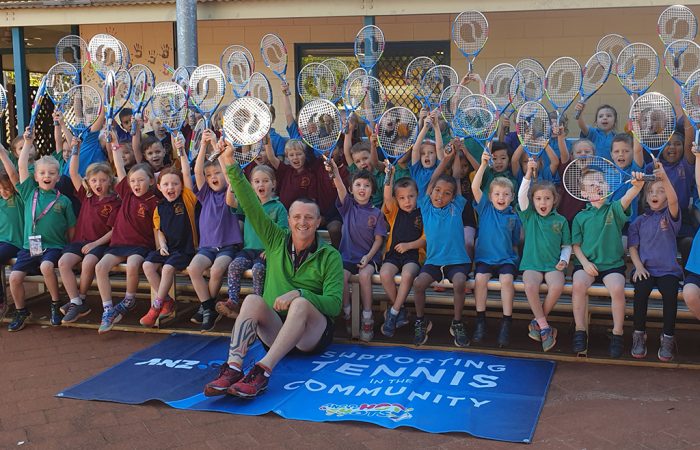Tennis Australia joins push to get kids more active
Tennis Australia is one of more than 50 organisations and institutions endorsing Sport Australia's commitment to encourage young people to be more active.
Melbourne, VIC, 9 December 2019 | Tennis Australia

As a national sporting organisation, Tennis Australia are committed to providing ongoing opportunities to help get kids active, ensuring they have the necessary skills to lead a long and healthy life.
On Tuesday 15 October Sport Australia released a position statement that details their commitment to help all Australians, especially children, bring out their best through physical activity – complementing their Physical Literacy Framework.
With the Australian Government’s goal to decrease physical inactivity by 15 per cent by 2030, Tennis Australia is one of more than 50 other national sporting organisations, peak bodies and academic institutions to endorse the position statement and call for action to keep young people active.
The position statement has been produced in an effort to prioritise the health and wellbeing of Australians, with the likes of Swimming Australia, Football Federation Australia, the Australian Council for Health, Physical Education and Recreation (ACHPER) and Active Healthy Kids Australia also endorsing the statement.
“The Physical Literacy framework will help provide kids with the necessary tools to lead an active and healthy lifestyle. Tennis is a sport which can be played for life by everyone and it all starts in schools where children are given their first taste of how sport can contribute so much more to their lives,” Craig Tiley, Tennis Australia CEO, said.
Junior tennis participation is currently at an all-time high with 702,509 children involved in the sport across Australia, with programs like ANZ Tennis Hot Shots, Sporting Schools and the ANZ Tennis Hot Shots Racquet Roadshow leading the way with investment into grassroots participation and providing opportunities for kids to be active.
By the end of 2019, the Racquet Roadshow will have delivered 140,000 racquets to first year school students across the country. In line with the Physical Literacy Framework, this introduction of a racquet to a child in their formative years at school can help play a role in their approach to physical activity.
This, combined with teacher education and the increased demand for tennis as part of the Sporting Schools program, is giving kids the confidence, competence and knowledge required to help them integrate physical activity into their lives and create lifelong memories through sport like tennis.
Sport Australia’s Position Statement on Physical Literacy
Sport Australia is committed to improving the lives of all Australians through sport and physical activity. We want more Australians moving more often because we know the enormous benefits to our health and wellbeing – physically, socially, psychologically and cognitively.
Success depends on generational change, with an emphasis on young Australians. Today’s environment and increasingly sedentary lifestyles mean many children are missing out on learning fundamental movement skills, like how to run, throw, kick, catch or jump. This is a vital first step in developing the physical literacy required to get Australians moving more.
Physical literacy is about developing knowledge and behaviours that give children the motivation and confidence to enjoy active lifestyles. Establishing active habits in children sets them on the path to happier and healthier lives, paving the way for a more productive Australia.
Educators, coaches and families all play a crucial role in promoting and developing physical literacy in children. This can be achieved through quality physical education, school and community sport programs and embracing daily play and physical activity.
Movement skills, like numeracy, reading and writing, can be learned. Research shows that children who engage in regular physical activity and improve their physical literacy, reap the numerous health benefits and also learn better academically.
Sport Australia wants all young Australians to benefit from these opportunities. We are committed to leading and collaborating with the sport, education and health sectors to ensure physical literacy is a core component of every child’s development and education.
Through this commitment we will strive to create a healthier generation of more active Australians.